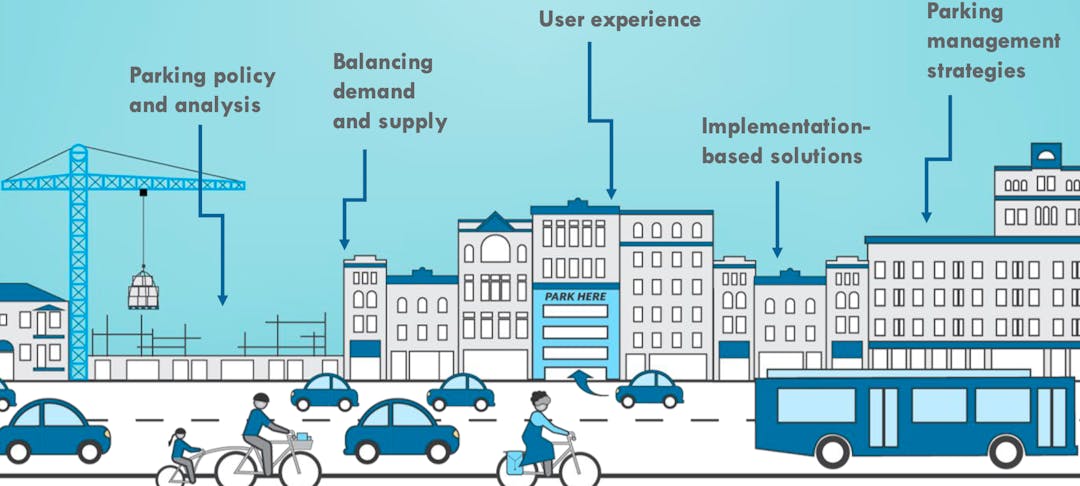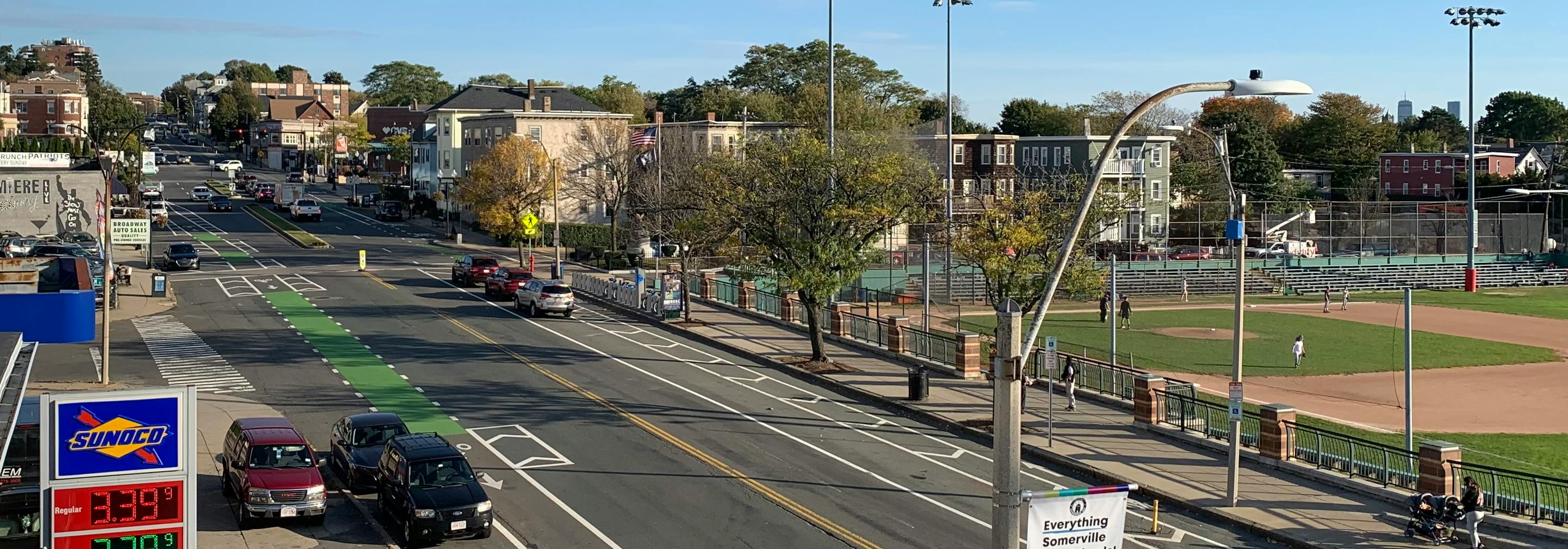The Citywide Parking & Curb Use Study is an effort to comprehensively understand the parking system in Somerville and make recommendations that will guide the City in bringing its parking policies in alignment with its city goals, community values, and future needs.
The city is seeking recommendations that will:
- Enhance mobility and access, improve the equity, safety, dependability, and sustainability of our transportation system, reduce our reliance on automobiles, allow for growth with less parking, and satisfy parking demand to the extent feasible and practical, recognizing that the city’s mode shift and climate goals will require less space dedicated toContinue reading
The Citywide Parking & Curb Use Study is an effort to comprehensively understand the parking system in Somerville and make recommendations that will guide the City in bringing its parking policies in alignment with its city goals, community values, and future needs.
The city is seeking recommendations that will:
- Enhance mobility and access, improve the equity, safety, dependability, and sustainability of our transportation system, reduce our reliance on automobiles, allow for growth with less parking, and satisfy parking demand to the extent feasible and practical, recognizing that the city’s mode shift and climate goals will require less space dedicated to vehicle parking.
- Reduce the annoyance and frustration associated with parking by making our parking system easier to understand and work more equitably, efficiently, and consistently for residents, businesses, and visitors.
- Prioritize our limited parking resources for persons with limited mobility options due to financial reasons, mobility impairments, disabilities, or other hardships, and disincentivize those with broad choice among mobility options from using limited parking resources.
- Ensure that any changes to parking policy are equitable and that recommendations include appropriate mitigation strategies for potential unequal burdens on specific disadvantaged populations.
The study will utilize and leverage data from a complete inventory of parking regulations on city streets and parking utilization counts from select areas across the city. It will include an evaluation of current enforcement/payment technologies as well as analysis of current parking supply and demand. Recommendations and an implementation action plan will be developed to reduce and distribute demand, expand capacity and supply, ensure equitable access, and improve administration and operation.
The study will be informed by public and expert input, as well as the Parking Study Task Force - a 21 member group consisting of representatives from City Council, the business community, the Council on Aging, the Commission for Persons with Disabilities, the Pedestrian & Transit Advisory Committee, the Bicycle Advisory Committee, and many city departments (Parking, Police, Fire, Racial & Social Justice, Sustainability & Environment, Engineering, Economic Development, Planning & Zoning, and Mobility).












So many emails sent and no response. All this data and I wonder if they actually talked to the residents who are affected by these changes. I live on Highland Ave, and most properties there do NOT have off street parking. Now btw the school spots for teachers, meters assigned to the library and the move of the bus stop we have to park far or if we come home after 6pm have to park close to 10 mins away. Imagine this why a little kid in the midst of winter especially when folks drive through highland like it's a highway. I dont know who you are talking to but you are making decisions w/o proper input. Not sure who they talked to scratch the parking structure in the school when they realized they couldnt afford it.
Please do not move forward with this. I feel like I'm being penalized because I live in a place with no off street parking. I deal with health issues that come and go. Some days, using public transportation to get to the pharmacy where my insurnace covers medication is too much to do without a car. It would be a 40+ minute trip due to bad mbta structure and walking up the hills in not an ask. I don't always have the luxury of being healthy enough to go someplace without a car, the money to always use ride shares, or someone else I can rely on to help me do things. Please either use the money you already take from your street sweeping tickets to improve public transit or please stop favoring only your able bodied citizens.
This study really emphasized that a lot of people aren't using their cars often. I would like to Somerville prioritize parking for the people who *need* their cars, either for work or errands. How can we do this? One way is to price permits according to usage, for example, if your car is regularly not going to be parked on the street from 10am-2pm, you get a cheaper permit than people who regularly are parked at that time. We could call this a "workers permit" and allow people who work non-conventional hours to submit paperwork for eligibility. Of course, this might encourage more people to drive, so that's something to think about. Less clear about running errands too.
Another option is to make parking illegal or very short term between those times too - this would allow ticketing of people who don't move their cars during that time, and encourage long-term storage folks to find off-street parking.
Both of these would do more to ensure that spaces are available for people who need to use their cars to get to work, or to run errands. We need to discourage people from clogging up our city streets with long-term parking, especially when it gets in the way of people finding parking when they're using their car for work.
Hi - a couple points I noticed:
- The discussions about residential parking utilization said nothing about the impact of street sweeping or snow emergencies. I don't know the numeric impact of these, but I know that if you need to find a spot when one of these is going on in one of the more heavily utilized areas, it can be incredibly difficult. I would urge you to see how this impacts the utilization math before deciding on a course of action that eliminates seemingly available capacity. Coupling parking changes to changes in sweeping or snow management regulations might be a fine way to handle this problem.
- There was some mention of raising permit prices for people with off-street spaces. I have an off street space, and I can see the reasoning of this. But I think it ignores the reality that some of us buy the permit because every *now and then* we need to park in the street. Perhaps because of work on our driveway, trees, house, etc, or because our TINY driveway doesn't accommodate your vehicle when you need to use the doors on both sides. In any case, if some people already paying a full year fee ($40 or whatever it is now) to park on the road a handful of times per year, it seems unfair to raise the rates further on just those people. I think it's important to remember that if you have off street parking, you're also paying for that (through rent or mortgage payment), even if the city doesn't get a cut. Don't punish us because we want a plan B for a difficult situation. If some sort of virtual pass system allowed a resident to park on the curb like...a handful of days a year, for a small cost, that would be a reasonable solution.
- If you're changing regulations, you should allow people to park in residential spaces for a longer amount of contiguous time (it's 48 hours now, I think?). This policy makes travel impossible.
- The "remove snow from on top of your permit" thing is kind of impossible to follow - you can't predict or control when it will snow. If the city will invest in a a license plate scanner for enforcement, please consider one that doesn't require line of sight (RFID or something) instead, so this requirement can be lifted.
- I am a car owner, and expect to continue being one. That said, I am in favor of making the city more comfortable for bicyclists (myself included), pedestrians, and ESPECIALLY public transit (bonus points if you can fix the T).
Thank you for the study and the presentation along with proposed solutions. While some of the solutions proposed could be beneficial there are some that are very troubling to me.
I implore our governing body to *not adopt* these two in particular:
* Higher charges for Residents with off-street parking
* Zone restrictions for main passes (visitors still make sense)
More information:
1) Higher charges for Residents with Off-Street parking.
- The study did not include (or consider) families with children. (Isn't that what we want to promote - a sense of community and vested residents)
- As a parent with multiple children we frequently need to drive and temporarily park in other zones for Sports, School, Summer Camp, Doctors appointments etc. and likewise have care takers from other areas of Somerville that need to park temporarily in our zone during the day.
- As someone with off-street parking I never park on the street unless it is necessary (going to one of the above-mentioned things or local shopping/food with small children) – Why penalize someone already paying more for an off-street parking spot who uses on-street parking less. This city is already one of the most expensive to live in. This mentality while I understand trying to promote more public transportation or biking (which is not safe in this city) falls short of reality especially for families with children. Instead, it promotes transient renters.
- As someone with small children needing strollers and diaper bags, etc. These do not work well with the busses that are not very reliable so that is not a viable option unfortunately.
2) Zone restrictions for main passes
- For the same reasons as above (Children, sports, school, camps, doctors, stores, food) this is a bad idea and would promote people with children to instead look at other options like Medford.
- During the meeting it was mentioned that perhaps a day/night split is an option. I think this makes more sense if need be. City-Wide parking during the day for residents with passes and zone restrictions for night. I still think that is solving a problem that doesn’t really exist, but at least has some logic to it, it is however bad for those who live near the boundaries of a zone.
I also did not find it clear what problem we are trying to solve other than not yet existing future statements like ‘things will be getting worse’. Clarity on that statement would be helpful (Understanding a concrete reason for change – like our parking dept is low on funding or our roads will be improved with X amount of funds and there is no other way to get that. Or Parking is oversaturated currently and we can’t fix that by making all the new construction have parking for some reason…).
Overall, I don’t mind a fair increase of cost if it is fair and does not penalize those of us who live in Somerville and have a vested interest in continuing to make Somerville a great place to live. If there were to be any higher cost for permits, I would propose those be for shirt-term renters (which I also think is a bad idea but better than the current proposal)
The fee structure for Somerville resident permits shouldn't be altered. The parking office doesn't seem to lack funds, and the goals of sustainability, decreased reliance on cars, etc, while beautiful in an aspirational way, ignore the reality that a strong majority of professionals and families strongly want, and indeed often need, at least in any realistic desirable lifestyle and daily grind, to have a car and somewhere convenient to park it. Unfortunately, this proposal and the larger traffic/parking conversation seem to be controlled by political circles in which it's fashionable to not have a car and moreover insist that others shouldn't have or want one either.
I'd speculate that should this proposal move forward, its practice will reveal a simple truth: demand for city-wide parking stickers is quite inelastic. Virtually every resident with a car will continue to get a city-wide parking sticker, but they will be upset at higher fees. Those in a decision-making position should keep in mind that, despite the wishes of their most ardent political supporters, the population of Somerville is increasing and moreover the demographics are trending in directions associated *with* car ownership. As elected stewards of Somerville's success and guardians of its future, they should prepare the city for the reality that there *will* be higher levels of vehicles in and thru Somerville in the future.
We really need to raise the cost of parking. Right now the city is effectively subsidizing car owners to keep their cars on the road. It has costs, and $40/year doesn't cover them. This goes against Somerville's value for equity - we should not be subsidizing the costs of cars owners. Car owners trend wealthier than non-car owners (nationally). There are many households in Somerville without cars, and they have to rely on other modes of transportation that is indirect competition with parked cars for curb space. Those other modes of transportation are also better for our whole community - they take up less space and produce fewer emissions, noise, and safety hazards. We need to be incentivizing beneficial behaviors, and subsidizing parking does not accomplish that.
Plus you found that a lot of people aren't even using their cars regularly (70%?) - they just leave them clogging up our streets, despite there being lots of other competing uses for those curb spaces that more beneficial to more community members. Use price elasticity to reduce parking demand - I full support raising the parking permit fee.
Some comments now that I have found this study...
1. Somerville has a rat problem. This should point strongly to LESS support for outdoor dining, rather than more. Let's not feed the rats. If the task force is unaware of Somerville's rat problem, please call 311 and ask the nice people there about it. Aside from that, it seems to me that outdoor restaurant seating blocks visibility of, and access to, adjacent businesses and--face it--is just plain ugly.
2. Why propose charging more for permits for those with off-street parking? Because I have off-street parking, I rarely use the permit (only when the landlord needs to use the space for maintenance etc.) and thus put almost no demand on resident parking. That logically should imply lower prices for such permits. (Maybe have daytime-only permits?)
3. Also, it seems to me that there are much better places for electric vehicle charging stations than on residential streets. This is, after all, a commercial activity and belongs in commercial areas. Stations in supermarket parking lots, for example, allow charging while shopping, and are good for the store as well (by attracting more shoppers).
4. I am not sure what is meant by "long-term storage," but I believe that vehicles are not supposed to occupy a street space for more than 48 hours (possibly a different number, but nothing I would call "long-term").
Why are you emailing now (7/29) about meetings that were held a month ago? Not a strategy to increase attendance. This is the first I've heard of your committee, let alone your draft (some will say "daft") recommendations.
Why do none of the ranked choices have "0" or "None of the above" as choices? You're operating on assumptions (or more likely, foregone conclusions) the public hasn't agreed to making responses to those questions a sham.
Why are parking spaces still occupied by restaurant seating? I'm guessing you could 100 spots or more by eliminating these "temporary" structures which are a private use of public space, an eyesore, and a sanitation nightmare?
I attended the virtual meeting last week and I don't feel that you have accurate information about what the majority of Somerville residents want in regards to parking. The survey you put out, in the middle of covid, had 1,700 respondents out of a population of 81,000? You are only considering the opinions of the people who were aware of this survey. Why didn't the city put a notice on every parked car with a Somerville sticker like they do when street sweeping is about to start? It seems like you are trying to push forward the agenda of a few residents while discounting the needs of most residents. I ask that you put the parking issue as a ballot question so that more residents can have their opinions heard.